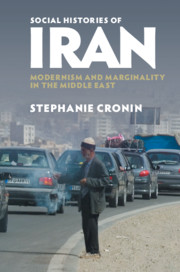Book contents
- Social Histories of Iran
- Social Histories of Iran
- Copyright page
- Contents
- Acknowledgements
- Introduction
- Part I Iran
- Part II The Wider Middle East
- 4 Noble Robbers, Avengers and Entrepreneurs
- 5 Islam, Slave Agency and Abolitionism in Iran, the Middle East and North Africa
- 6 Modernism and the Politics of Dress
- Bibliography
- Index
5 - Islam, Slave Agency and Abolitionism in Iran, the Middle East and North Africa
from Part II - The Wider Middle East
Published online by Cambridge University Press: 26 January 2021
- Social Histories of Iran
- Social Histories of Iran
- Copyright page
- Contents
- Acknowledgements
- Introduction
- Part I Iran
- Part II The Wider Middle East
- 4 Noble Robbers, Avengers and Entrepreneurs
- 5 Islam, Slave Agency and Abolitionism in Iran, the Middle East and North Africa
- 6 Modernism and the Politics of Dress
- Bibliography
- Index
Summary
Modern understanding of the institution of slavery and the experience of slave themselves has been largely defined and dominated by a template drawn from the modern plantation slavery of the Americas. Images of slave agency and of abolitionism have been derived from the same template in which slave agency is equated with unambiguous resistance to slavery as such, and abolitionism attributed to a moral response originating within the slave-owning society and possessing a strong redemptive dimension. The weakness of an elite abolitionism regarding ‘Islamic’ slavery in the states of the eastern Mediterranean has often been noted and contrasted with the moral force and redemptive power of Western abolitionism. This chapter argues, firstly, that the ascription of a uniquely Islamic character to Middle Eastern and North African slavery, which in fact shares its key characteristics with practices and notions common to medieval and early modern southern Europe, is a survival of nineteenth century Orientalism. It argues, secondly, that the relative weakness of an abolitionist sentiment can best be explained not by the power of an Islamic discourse but by the structures of slavery in the region and especially the forms of agency to which those structures gave rise.
- Type
- Chapter
- Information
- Social Histories of IranModernism and Marginality in the Middle East, pp. 201 - 234Publisher: Cambridge University PressPrint publication year: 2021

